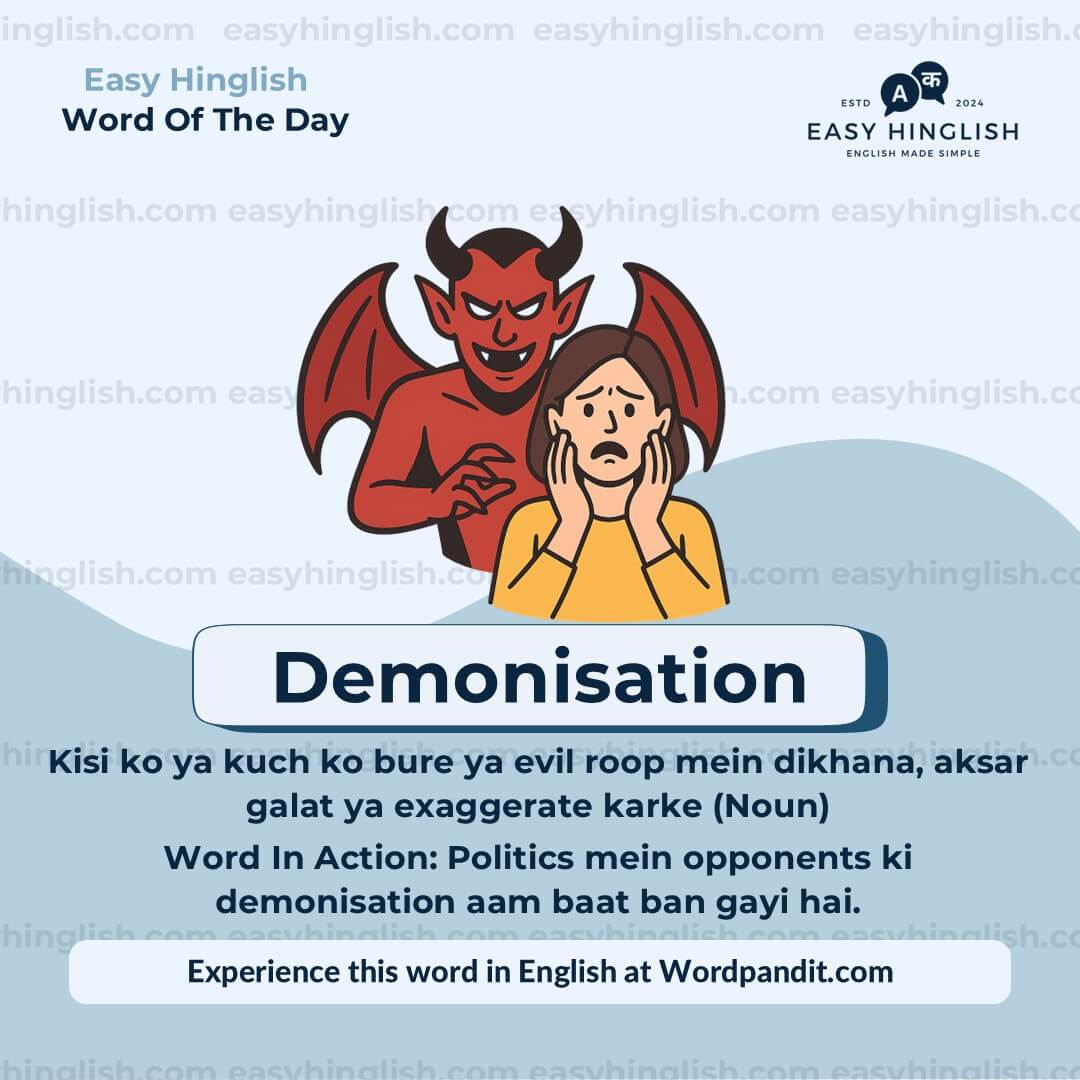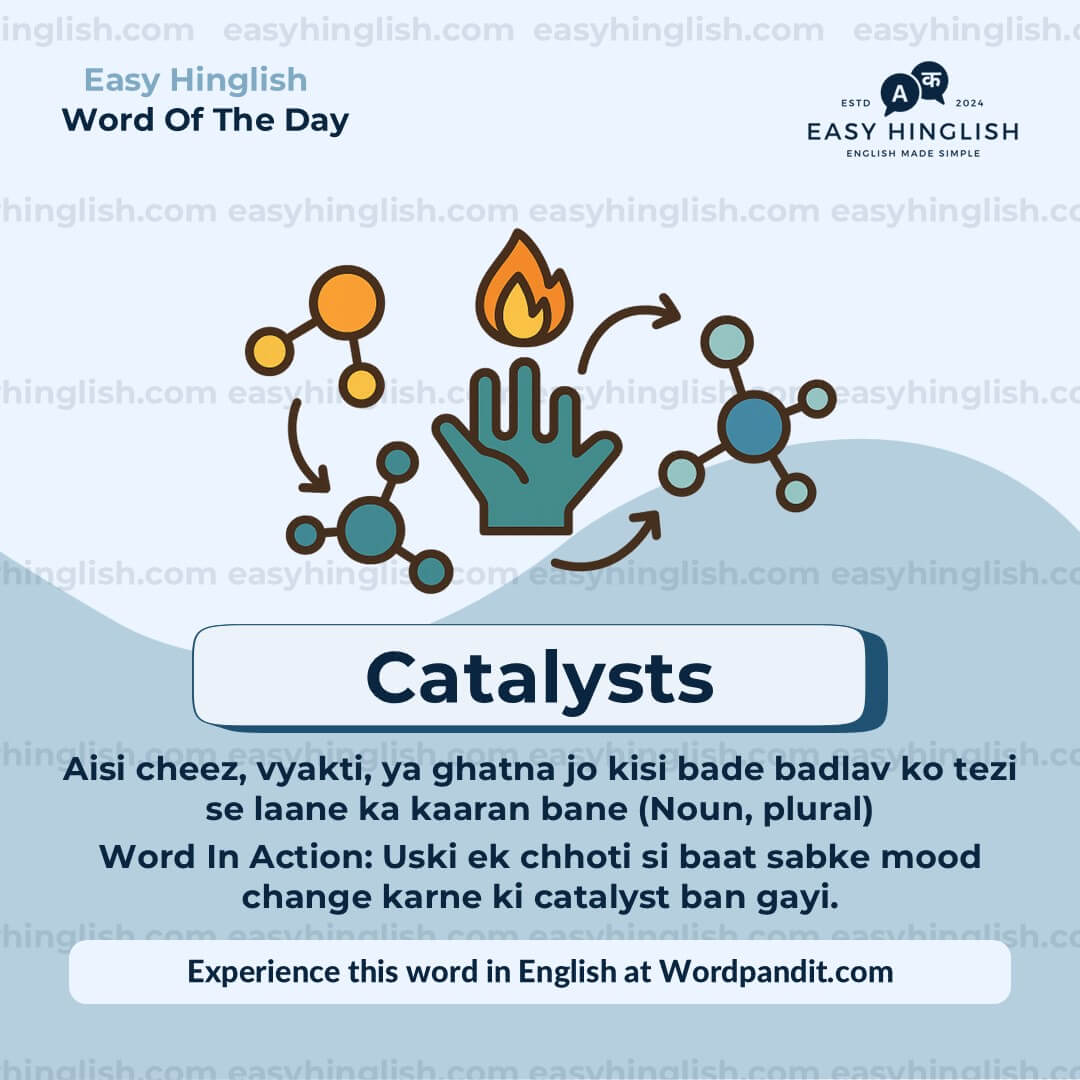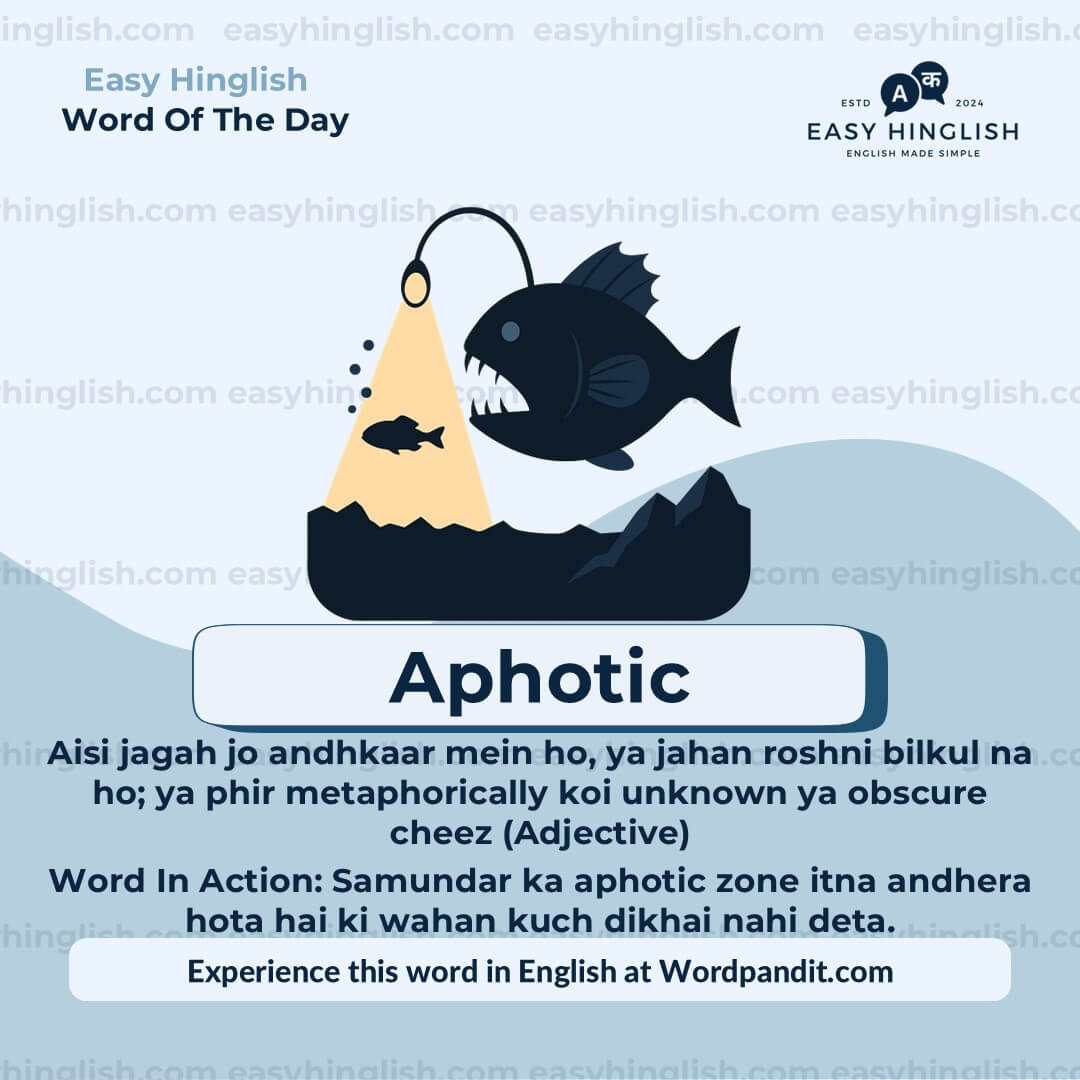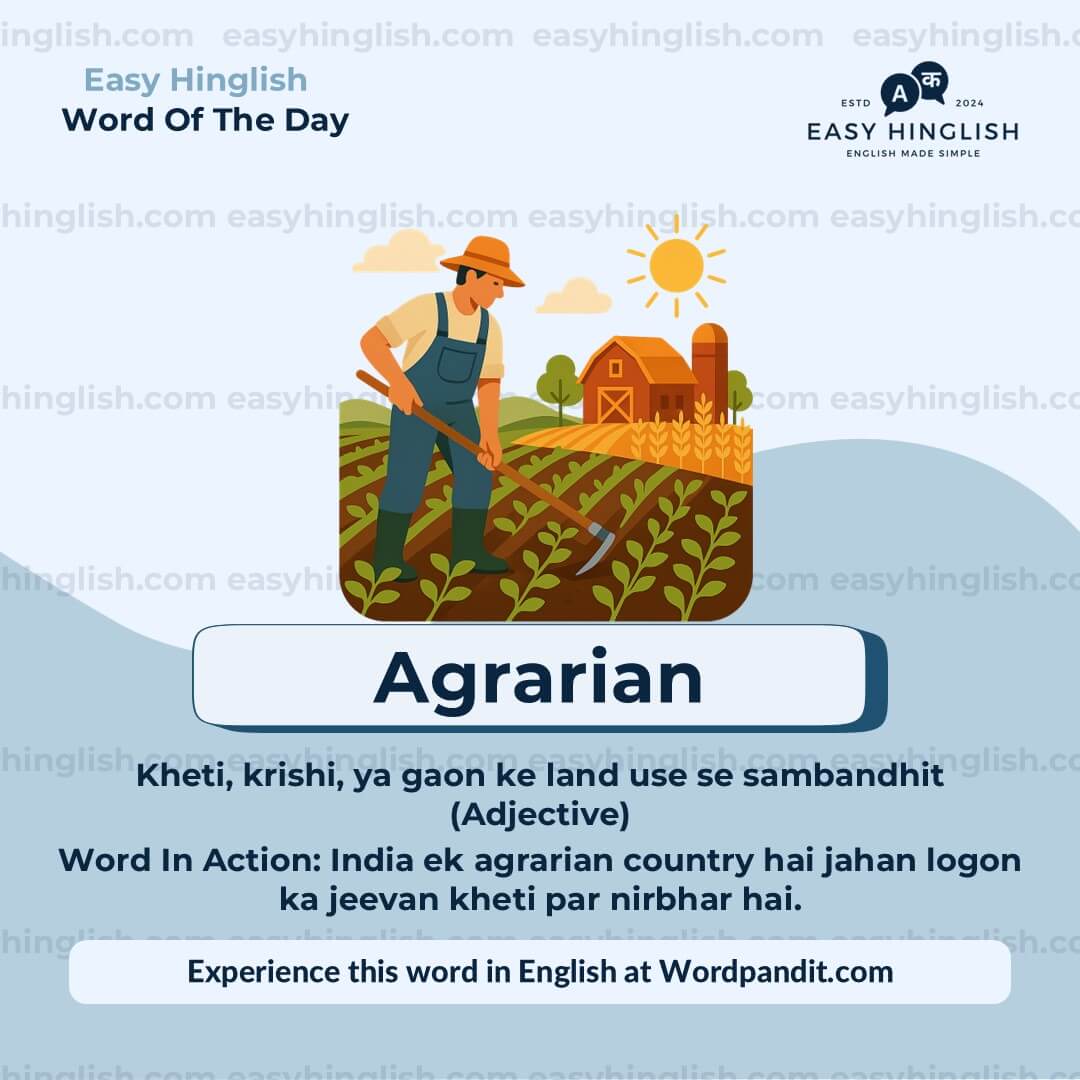Daily Vocabulary Indian Newspapers aur Publications se Seekho
Welcome to Wordpandit ka Indian Vocabulary Hub
Wordpandit par, hum samajhte hain ki ek achhi vocabulary develop karne ke liye local context samajhna bhi zaroori hai. Is section ka focus hai aapke vocabulary ko India ke leading newspapers aur publications se naye shabdon aur phrases ke zariye improve karna, taaki aap practical, relevant, aur uniquely Indian words seekh sakein.
Indian Sources Itne Important Kyun Hain?
Hum maante hain ki kisi bhi language ko sikhne ka sabse best tareeka hai uske local content me immerse hona. Isi wajah se hum carefully words curate karte hain top Indian newspapers aur publications se, jaise:
- The Hindu
- The Times of India
- The Economic Times
- Hindustan Times
- Live Mint
- The Indian Express
- Aur bhi bahut saare...
Hamesha Updated Raho, Hamesha Relevant Raho
Daily updates ke saath, aap Indian news sources se naye words seekhoge jo Indian society aur culture ke latest trends ko reflect karte hain. Hamara focus hai aise words provide karna jo aapke liye real-world me useful ho.
Wordpandit Aapke Learning Goals Ko Kaise Support Karta Hai?
Chahe aap exams ki preparation kar rahe ho, professional communication improve karna chahte ho, ya sirf naye words seekhna chahte ho, Wordpandit har step par aapki madad karega.
Practical Tareeke Se Seekho
Hamari interactive learning methodology me real-world examples, engaging activities, aur context-based usage shamil hain, taaki har naya shabd aapki active vocabulary ka hissa ban sake.
Aaj Hi Indian Vocabulary Seekhna Shuru Karo!
Wordpandit Kyun Choose Karein?
Practical Learning: Aise words seekho jo aapko real-world reading aur communication me sach me kaam aayenge, taaki aapki comprehension aur bolne ki skills improve ho.
Diverse Content: Current affairs se lekar scientific breakthroughs tak, hamare different sources aapko multiple domains ka vocabulary sikhate hain.
Effortless Integration: Wordpandit ko apni daily routine ka part banao. Sirf kuch minute har din dene se aapki vocabulary time ke saath kaafi improve ho sakti hai.
Aapka Vocabulary Mastery Tak Ka Safar
- Regularly hamare Daily Vocabulary section ko visit karo
- Naye words explore karo aur unka context me use samjho
- In words ko apni writing aur bolne ki practice me use karne ki koshish karo
- Jaise-jaise aapke words badhte hain, apni progress ko track karo
Aaj Se Apni Vocabulary Journey Shuru Karo!
Wordpandit ke saath vocabulary improve karna start karo. Roz thoda effort dalne se aap ek strong vocabulary develop kar sakte ho jo academic, professional, aur personal life me kaafi kaam aayegi.
Yaad rakho, ek naya shabd roz seekhna linguistic limitations ko door karne ka best tareeka hai! Wordpandit ko apni daily learning journey ka sathi banao aur vocabulary excellence ki taraf badho!
WORD-1: Demonisation
Sandarbh (Context):
"Until his wife’s arrest, the public discourse around the Indore man’s murder predictably saw the demonisation of Meghalaya, and the Northeast as a whole, as “non-tourism-friendly”, “unsafe for outsiders”, “crime-prone”, “jungalee” and “brainwashed by Christian missionaries”." - The Wire
Vyakhya (Explanatory Paragraph):
“Demonisation” ka matlab hota hai kisi vyakti, samudaay ya jagah ko bure, khatarnak ya evil tarike se dikhana—aksar exaggeration, stereotypes ya propaganda ke zariye. Upar ke example mein, media ne pura Northeast region ko ek negative light mein dikhaya, bina poore context samjhe.
Arth (Meaning): Kisi ko ya kuch ko bure ya evil roop mein dikhana, aksar galat ya exaggerate karke (Noun)
Uccharan (Pronunciation): dee-muh-nuh-zay-shun
Kathinai Star (Difficulty Level): ⭐⭐⭐
Utpatti (Etymology): “Demonise” se nikla hai, jiska root hai Greek shabd *daimon* (spirit ya deity), jo time ke saath “evil portray” karne ka matlab dene laga.
Prashant Sir Ke Tathya (Prashant Sir's Notes):
Yeh word socio-political analysis mein kaafi kaam ka hai. Jab kisi group ko target karke media ya politics mein negativity failai jati hai, toh uss process ko “demonisation” kehte hain. Important hai samajhna ki kab normal criticism ek dangerous narrative ban jata hai.
Samanarthi & Vipritarthi (Synonyms & Antonyms):
Samanarthi (Synonyms): vilification, defamation, stigmatization, condemnation, slander
Vipritarthi (Antonyms): praise, glorification, admiration, endorsement, validation
Udaharan (Usage Examples):
- Media ne protestors ko aise dikhaya jaise woh desh ke dushman ho — yeh ek classic demonisation ka example hai.
- Political ads mein immigrants ki demonisation kaafi zyada ho rahi hai aaj kal.
Sanskritik Sandarbh (Cultural Reference):
"Minorities ki demonisation authoritarian regimes ka purana hatha hai." - George Orwell ki *1984* jaisi kitaabon mein aisa pattern dikhayi deta hai.
Sochiye (Think About It):
Jab media kisi group ki demonisation karta hai, toh uska asar public policy aur aam logon ki soch par kaise padta hai?
Chhoti Kriya (Quick Activity):
Kisi ek news article ko padhiye aur dekhiye kya kisi samudaay ko unfairly target kiya gaya hai? Language observe kijiye aur sochiye ki usse kaise zyada balanced banaya ja sakta tha.
Yaad Karne Ka Tarika (Memory Tip):
“Demonisation” yaani kisi ko public ke nazar mein "demon" banake dikhana. Bas yaad rakho — “turning people into demons”!
Vastavik Jeevan Me Upyog (Real-World Application):
Aaj ke media-heavy world mein, yeh word samajhna bohot zaroori hai. Isse hum biased narratives aur unfair portrayals ko samajh sakte hain — aur ek zyada informed citizen ban sakte hain.
WORD-2: Catalysts
Sandarbh (Context):
"This is one of the catalysts of dissent amongst various peoples of the Northeast against the Indian state itself." - The Wire
Vyakhya (Explanatory Paragraph):
“Catalysts” un cheezon ya logon ko kehte hain jo kisi bade badlav ya action ko tezi se shuru karte hain, khud zyada badle bina. Jaise kisi nayi policy ya kisi incident ke baad ek social movement shuru ho jaye, toh woh incident ek “catalyst” ke roop mein kaam karta hai. Upar ke sentence mein bhi aisi hi ek baat kahi gayi hai jo logon ke beech gussa aur virodh bhadka rahi hai.
Arth (Meaning): Aisi cheez, vyakti, ya ghatna jo kisi bade badlav ko tezi se laane ka kaaran bane (Noun, plural)
Uccharan (Pronunciation): ka-tuh-lists
Kathinai Star (Difficulty Level): ⭐⭐
Utpatti (Etymology): “Catalyst” originally ek chemistry term tha (Greek *katalusis* = dissolution), jiska use baad mein har tarah ke change agents ke liye hone laga.
Prashant Sir Ke Tathya (Prashant Sir's Notes):
“Catalysts” ka use science ke alawa bhi metaphorically hota hai. Essay ya analysis mein jab aap kisi badlav ka reason batate ho, toh "catalyst" word us point ko strong bana deta hai. Bahut kaam ka word hai jab aapko kisi change ka source identify karna ho.
Samanarthi & Vipritarthi (Synonyms & Antonyms):
Samanarthi (Synonyms): trigger, spark, impetus, driver, instigator
Vipritarthi (Antonyms): deterrent, obstacle, barrier, hindrance, suppressor
Udaharan (Usage Examples):
- Woh incident poore desh mein protest ka catalyst ban gaya.
- Education kai logon ke liye ek catalyst hota hai unki life better banane mein.
Sanskritik Sandarbh (Cultural Reference):
"Archduke Franz Ferdinand ki assassination World War I ka catalyst thi." - History mein baar-baar quoted example
Sochiye (Think About It):
Kya ek single insaan society mein bade badlav ka catalyst ban sakta hai, ya hamesha ek movement zaroori hoti hai?
Chhoti Kriya (Quick Activity):
Apni life ka koi ek aisa moment yaad kijiye jo kisi bade change ka reason bana. Us moment ko ek catalyst ke roop mein describe karke likhiye.
Yaad Karne Ka Tarika (Memory Tip):
Sochiye ek “cat” jise room mein chod diya jaye aur sab kuch hila de — woh khud toh stable hai, par uske aate hi sab kuch change ho gaya. Wahi hai catalyst!
Vastavik Jeevan Me Upyog (Real-World Application):
Business mein innovation catalyst hota hai growth ka. Politics mein gussa ya injustice catalyst ban sakta hai andolan ka. Catalyst ko samajhna hume change ki psychology ko better samajhne mein madad karta hai.
WORD-3: Egress
Sandarbh (Context):
"In Meghalaya, these include demands for an Inner Line Permit (ILP) system that makes the tracking of entry and egress of non-residents of the state a more transparent (and perhaps complicated) process." - The Wire
Vyakhya (Explanatory Paragraph):
“Egress” ka matlab hota hai kisi jagah se bahar nikalna ya chhodna. Jaise “entry” aana hota hai, waise hi “egress” jaana hota hai. Ye word formal contexts mein zyada use hota hai — jaise rules, building safety codes, ya government tracking systems mein. Upar ke sentence mein, Meghalaya mein logon ke aane (entry) aur jaane (egress) ko track karne ki baat ki gayi hai.
Arth (Meaning): Kisi jagah se bahar nikalne ya chhodne ka kriya (Noun)
Uccharan (Pronunciation): ee-gres
Kathinai Star (Difficulty Level): ⭐⭐⭐
Utpatti (Etymology): Latin shabd *egressus* se aaya hai, jiska matlab hai “bahar jaana”, jiska root verb tha *egredi* (to go out). “Exit” se closely related hai.
Prashant Sir Ke Tathya (Prashant Sir's Notes):
“Egress” aam bolchaal mein kam aata hai, lekin legal ya policy-based writings mein kaafi use hota hai. Jab aap kisi movement ko technical ya precise tareeke se describe karna chahte ho, tab yeh word useful hota hai. Exams aur essays mein bhi impactful lagta hai.
Samanarthi & Vipritarthi (Synonyms & Antonyms):
Samanarthi (Synonyms): exit, departure, withdrawal, exodus, emergence
Vipritarthi (Antonyms): entry, ingress, arrival, entrance, admission
Udaharan (Usage Examples):
- Fire emergency plan mein entry aur egress ke clear paths hone chahiye.
- Alert ke baad officials ne tourists ke egress ko monitor kiya.
Sanskritik Sandarbh (Cultural Reference):
"Ingress and egress" ek legal phrase hai jo real estate documents mein aksar aata hai — matlab kisi property mein aane jaane ka haq. - Legal Usage
Sochiye (Think About It):
Governments entry ko toh track karti hi hain, lekin egress ko track karna equally important kyun hota hai?
Chhoti Kriya (Quick Activity):
Ek sentence likhiye jisme “entry” aur “egress” dono ho — kisi building, sheher, ya system ke context mein.
Yaad Karne Ka Tarika (Memory Tip):
“Egress” ko yaad rakho “exit-gress” ke roop mein — “gress” yaani “go” — matlab “go out”!
Vastavik Jeevan Me Upyog (Real-World Application):
Architecture mein fire exits ko “egress routes” kehte hain. Legal contracts mein property ke entry aur egress rights specify kiye jaate hain. Security aur data protection mein bhi yeh word important hai — jaise data ka system se egress hona.
WORD-4: Aphotic
Sandarbh (Context):
"Hidden gems” and “secret spots” are unveiled and “tourist spots” are manufactured in the aphotic parts of the region. This is, of course, also facilitated by private tour operators presenting sanitised clips of “must visit” spots in the region as “alternatives to international destinations”." - The Wire
Vyakhya (Explanatory Paragraph):
“Aphotic” un jagahon ya cheezon ko describe karta hai jahan roshni nahi hoti ya bohot kam hoti hai. Ye shabd originally science, especially marine biology mein use hota hai—jaise samundar ke woh parts jahan sunlight nahi pahuchti. Lekin ab iska metaphorical use bhi hota hai—jaise kisi unknown ya hidden jagah ko describe karne ke liye. Upar ke example mein, “aphotic parts” ka matlab hai Northeast ke woh areas jo pehle andekhe the, lekin ab unhe tourist spots banaya ja raha hai.
Arth (Meaning): Aisi jagah jo andhkaar mein ho, ya jahan roshni bilkul na ho; ya phir metaphorically koi unknown ya obscure cheez (Adjective)
Uccharan (Pronunciation): ay-foh-tik
Kathinai Star (Difficulty Level): ⭐⭐⭐⭐
Utpatti (Etymology): Greek shabd *a-* (without) + *phōs* (light) — literally matlab “bina roshni ke”. Pehle marine biology mein use hota tha, ab creative writing mein bhi aata hai.
Prashant Sir Ke Tathya (Prashant Sir's Notes):
“Aphotic” ek poetic aur high-level word hai jo descriptive ya metaphorical writing mein depth laata hai. Chahe kisi physical andhkaar ki baat ho, ya kisi cultural ya psychological darkness ki — yeh word usko beautifully capture karta hai. Essay aur fiction dono mein impactful hota hai.
Samanarthi & Vipritarthi (Synonyms & Antonyms):
Samanarthi (Synonyms): dark, lightless, obscure, shadowy, unlit
Vipritarthi (Antonyms): illuminated, bright, visible, lit, radiant
Udaharan (Usage Examples):
- Samundar ke aphotic zone mein rehne wale jeev sunlight ke bina jeene ke liye evolve ho gaye hain.
- Woh gaon outsiders ke liye aphotic tha, jab tak wahan development projects nahi aaye.
Sanskritik Sandarbh (Cultural Reference):
BBC Earth ke *The Blue Planet* jaise documentaries mein aphotic zone ko ek mysterious aur glowing life forms se bhara hua dikhaya gaya hai — total darkness mein jeevan. - BBC Earth
Sochiye (Think About It):
Jab ek aphotic (hidden) jagah ko global tourism ke liye khola jata hai, toh uska cultural aur environmental impact kya ho sakta hai?
Chhoti Kriya (Quick Activity):
Kisi aise place ya experience ko describe kijiye jo aapko physically andhera ya metaphorically hidden laga ho — jise aap “aphotic” keh sakte ho.
Yaad Karne Ka Tarika (Memory Tip):
“Aphotic” = “A” (without) + “photic” (light) → yaani bina roshni ke. Sochiye ek cave ya samundar ke gehre zone ka jahan sunlight nahi pahuchti.
Vastavik Jeevan Me Upyog (Real-World Application):
“Aphotic” word ecology, marine science, creative writing, aur cultural analysis mein use hota hai — jab aapko kisi unknown, hidden, ya lightless situation ko describe karna ho — chahe literal ho ya symbolic.
WORD-5: Agrarian
Sandarbh (Context):
"Unintended consequences of this are microcosmic shifts from agrarian or natural resource-based economies in these places, to the more unpredictable and “tourist-dependent” models of income." - The Wire
Vyakhya (Explanatory Paragraph):
“Agrarian” un sab cheezon se related hota hai jo farming, kheti, ya rural land use se judi hoti hain. Jaise gaon ki economy jo kheti-bari aur pashupalan pe depend karti ho. Upar ke sentence mein yeh word us traditional farming economy ka zikr karta hai jo ab dheere-dheere tourism-based aur unpredictable income models ki taraf badal rahi hai.
Arth (Meaning): Kheti, krishi, ya gaon ke land use se sambandhit (Adjective)
Uccharan (Pronunciation): uh-grare-ee-uhn
Kathinai Star (Difficulty Level): ⭐⭐
Utpatti (Etymology): Latin shabd *agrarius* se aaya hai, jiska root hai *ager* — jiska matlab hota hai “field” ya khet.
Prashant Sir Ke Tathya (Prashant Sir's Notes):
“Agrarian” word geography, social science, aur economics ke context mein bohot important hai. Jab aap rural economy, farmers ki lifestyle, ya development policies ke effects ki baat karte ho, tab yeh word kaafi useful hota hai. Essay writing mein yeh word aapko edge de sakta hai.
Samanarthi & Vipritarthi (Synonyms & Antonyms):
Samanarthi (Synonyms): farming-related, agricultural, rural, pastoral, rustic
Vipritarthi (Antonyms): urban, industrial, nonagricultural, metropolitan
Udaharan (Usage Examples):
- Us region ki agrarian economy industrialization ke kaaran disrupt ho gayi.
- Bhootkal ke kai political movements agrarian struggles aur land reforms se judey hue the.
Sanskritik Sandarbh (Cultural Reference):
“The Agrarian Question” Marxist aur postcolonial theory mein ek major theme hai, jo agriculture ka role capitalism aur modern society mein highlight karta hai. - Academic Discourse
Sochiye (Think About It):
Agrarian lifestyle ko chhod kar tourism-based economy ko adopt karne se long-term mein kya challenges aa sakte hain?
Chhoti Kriya (Quick Activity):
Aaj ke samay mein agrarian communities kin 3 challenges ka samna kar rahi hain? Har ek challenge ke liye ek possible solution bhi likhiye.
Yaad Karne Ka Tarika (Memory Tip):
“Agrarian” ko yaad rakhne ke liye bas “agriculture” sochiye — dono ka root same hai, *agr-* yaani “field” ya “khet”.
Vastavik Jeevan Me Upyog (Real-World Application):
“Agrarian” shabd food security, land reform, rural development, aur environmental sustainability jaise topics mein kaafi use hota hai. Yeh word samajhne se aap farming se judi samasyaon ko better analyze kar sakte hain.













